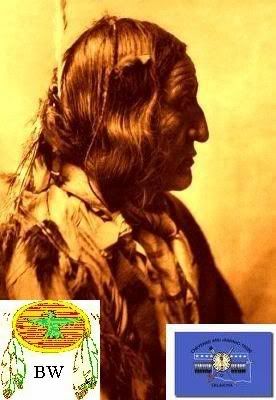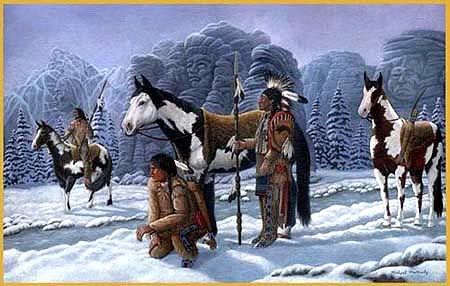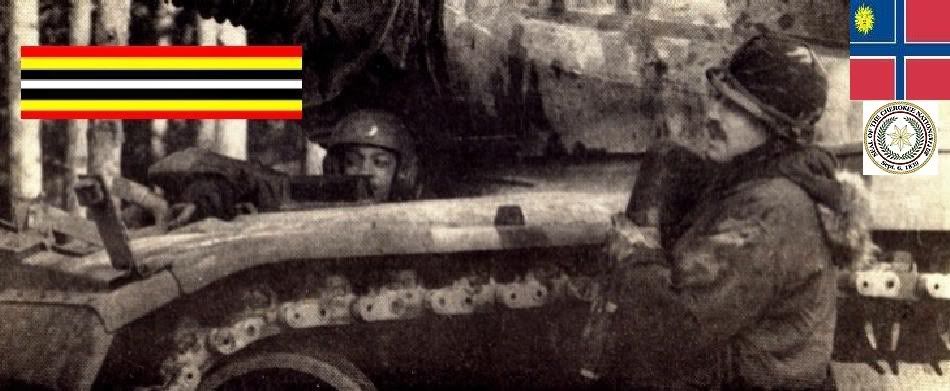|

Chief Little Wolf
Warriors Citation
Little Wolf was a handsome man, with the native dignity and gentleness, musical voice, and pleasant address of so many brave
leaders of his people. One day when he was dining with us at our home on the reservation, he was asked for some reminiscences
of his early life. He was rather reluctant to speak, but a friend who was present contributed the following: "Perhaps I can
tell you why it is that he has been a lucky man all his life. When quite a small boy, the tribe was one winter in want of
food, and his good mother had saved a small piece of buffalo meat, which she solemnly brought forth and placed before him
with the remark: 'My son must be patient, for when he grows up he will know even harder times than this.' "He had eaten nothing
all day and was pretty hungry, but before he could lay hands on the meat a starving dog snatched it and bolted from the teepee.
The mother ran after the dog and brought him back for punishment. She tied him to a post and was about to whip him when the
boy interfered. 'Don't hurt him, mother!' he cried; 'he took the meat because he was hungrier than I am!'" Another kind act
of his under trying circumstances; while still a youth, he was caught out with a party of buffalo hunters in a blinding blizzard.

They were compelled to lie down side by side in the snowdrifts, and it was a day and a night before they could get out. The
weather turned very cold, and when the men arose they were in danger of freezing. Little Wolf pressed his fine buffalo robe
upon an old man who was shaking with a chill and himself took the other's thin blanket. As a full-grown young man, he was
attracted by a maiden of his tribe, and according to the custom then in vogue the pair disappeared. When they returned to
the camp as man and wife, behold! there was great excitement over the affair. It seemed that a certain chief had given many
presents and paid unmistakable court to the maid with the intention of marrying her, and her parents had accepted the presents,
which meant consent so far as they were concerned. But the girl herself had not given consent. The resentment of the disappointed
suitor was great. It was reported in the village that he had openly declared that the young man who defied and insulted him
must expect to be punished. As soon as Little Wolf heard of the threats, he told his father and friends that he had done only
what it is every man's privilege to do. "Tell the chief," said he, "to come out with any weapon he pleases, and I will meet
him within the circle of lodges. He shall either do this or eat his words. The woman is not his. Her people accepted his gifts
against her wishes. Her heart is mine." The chief apologized, and thus avoided the inevitable duel, which would have been
a fight to the death. The early life of Little Wolf offered many examples of the dashing bravery characteristic of the Cheyennes,
and inspired the younger men to win laurels for themselves. He was still a young man, perhaps thirty-five, when the most trying
crisis in the history of his people came upon them. As I know and as Doctor Grinnell's book amply corroborates, he was the
general who largely guided and defended them in that tragic flight from the Indian Territory to their northern home. "They
had come," he wrote, "from the high, dry country of Montana and North Dakota to the hot and humid Indian Territory. They had
come from a country where buffalo and other game were still plentiful to a land where the game had been exterminated. Immediately
on their arrival they were attacked by fever and ague, a disease wholly new to them. Food was scanty, and they began to starve.
The agent testified before a committee of the Senate that he never received supplies to subsist the Indians for more than
nine months in each year. These people were meat-eaters, but the beef furnished them by the government inspectors was no more
than skin and bone. The agent in describing their sufferings said: 'They have lived and that is about all.' "The Native Americans
endured this for about a year, and then their patience gave out. They left the agency to which they had been sent and started
north. Though troops were camped close to them, they attempted no concealment of their purpose. Instead, they openly announced
that they intended to return to their own country. The march was well known of the Nez Pierce under Chief Joseph, but little
is remembered of the Dull Knife outbreak and the march to the north led by Little Wolf. The story of the journey has not been
told, but in the traditions of the old army this campaign was notable, and old men who were stationed on the plains forty
years ago are apt to tell you, if you asked them, that there never was such another journey since the Greeks marched to the
sea. "The fugitives pressed constantly northward undaunted, while orders were flying over the wires, and special trains were
carrying men and horses to cut them off at all probable points on the different railway lines they must cross. Of the three
hundred Indians, sixty or seventy were warriors -- the rest old men, women, and children. An army officer once said that thirteen
thousand troops were hurrying over the country to capture or kill these few poor people who had left the fever-stricken South,
and in the face of every obstacle were steadily marching northward. "The War Department set all its resources in operation
against them, yet they kept on. If troops attacked them, they stopped and fought until they had driven off the soldiers, and
then started north again. Sometimes they did not even stop, but marched along, fighting as they marched. For the most part
they tried -- and with success -- to avoid conflicts, and had but four real hard fights, in which they lost half a dozen men
killed and about as many wounded." It must not be overlooked that the appeal to justice had first been tried before taking
this desperate step. Little Wolf had gone to the agent about the middle of the summer and said to him: "This is not a good
country for us, and we wish to return to our home in the mountains where we were always well. If you have not the power to
give permission, let some of us go to Washington and tell them there how it is, or do you write to Washington and get permission
for us to go back." "Stay one more year," replied the agent, "and then we will see what we can do for you. "No," said Little
Wolf. "Before another year there will be none left to travel north. We must go now." Soon after this it was found that three
of the Warriors had disappeared and the chief was ordered to surrender ten warriors as hostages for their return. He refused.
"Three men," said he, "who are traveling over wild country can hide so that they cannot be found. You would never get back
these three, and you would keep my men prisoners always." The agent then threatened if the ten warriors were not given up
to withhold their rations and starve the entire tribe into submission. He forgot that he was addressing a Cheyenne. These
people had not understood that they were prisoners when they agreed to friendly relations with the government and came upon
the reservation. Little Wolf stood up and shook hands with all present before making his final deliberate address. "Listen,
my friends, I am a friend of the white people and have been so for a long time. I do not want to see blood spilt about this
agency. I am going north to my own country. If you are going to send your soldiers after me, I wish you would let us get a
little distance away. Then if you want to fight, I will fight you, and we can make the ground bloody at that place." The Cheyenne
was not bluffing. He said just what he meant, and presumed the agent took the hint, for although the military were there they
did not undertake to prevent the Native Americans' departure. Next morning the teepees were pulled down early and quickly.
Toward evening of the second day, the warrior scouts signaled the approach of troops. Little Wolf called his warriors together
and advised them under no circumstances to fire until fired upon. An Arapahoe scout was sent to them with a message. "If you
surrender now, you will get your rations and be well treated." After what they had endured, it was impossible not to hear
such a promise with contempt. Said Little Wolf: "We are going back to our own country. We do not want to fight." He was riding
still nearer when the soldiers fired, and at a signal the Cheyennes made a charge. They succeeded in holding off the troops
for two days, with only five warriors wounded and none killed, and when the military retreated the Native Americans continued
northward carrying their wounded. This sort of thing was repeated again and again. Meanwhile Little Wolf held his men under
perfect control. There were practically no depredations. They secured some boxes of ammunition left behind by retreating troops,
and at one point the young warriors were eager to follow and destroy an entire command who were apparently at their mercy,
but their leader withheld them. They had now reached the buffalo country, and he always kept his main object in sight. He
was extraordinarily calm. It was told years afterward: "Little Wolf did not seem like a human being. He seemed like a bear."
It is true that a warrior of his type in a crisis becomes spiritually transformed and moves as one in a dream. At the Running
Water the band divided, Dull Knife going toward Red Cloud agency. He was near Fort Robinson when he surrendered and met his
sad fate. Little Wolf remained all winter in the Sand Hills, where there was plenty of game and no white men. Later he went
to Montana and then to Pine Ridge, where he and his people remained in peace until they were removed to Lame Deer, Montana,
and there he spent the remainder of his days. There is a clear sky beyond the clouds of racial prejudice, and in that final
Court of Honor a noble soul like that of Little Wolf has a place. From: historical accounts & records


LINK TO BRAVEHORSE WARRIORS VOLUME TWO
|

